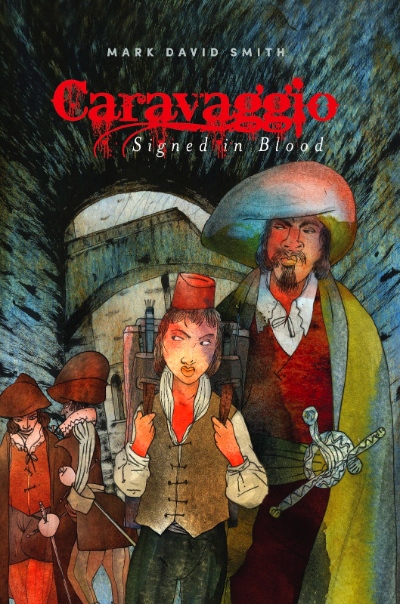 There are several works of fiction, poetry and art among the 25 – 30 books released by Christian authors from the Metro Vancouver area this year. It is interesting to note that while the authors are local, the subject matter of the fiction is not – most are set in remote times and places.
There are several works of fiction, poetry and art among the 25 – 30 books released by Christian authors from the Metro Vancouver area this year. It is interesting to note that while the authors are local, the subject matter of the fiction is not – most are set in remote times and places.
In this second of a series, I will look at those books. In part one, I looked at (broadly) Bible-related books, and have still to consider those in the realm (again broadly) of Christian living. These are not reviews – I don’t have most of the books – but are simply meant to introduce the books; many of them would make good Christmas presents.
Mark David Smith: Caravaggio: Signed in Blood
They say it’s hard to get teenage boys interested in reading. No doubt, but Mark David Smith clearly has some ideas on the subject. Not many books are launched with a sword fight, but, appropriately, Caravaggio: Signed in Blood was introduced with just such a flourish November 7 at Byrne Creek Secondary School in Burnaby, where Mark teaches English. He reports that “Academie Duello led things off with an exciting demonstration of sword-fighting techniques, followed by a workshop with 20 members of the audience.”
The work of historical fiction revolves around the life of 15 year old Beppo, an indentured servant in Rome, who is accused of murder. The only person who can help him is one of the most celebrated artists of his day – Caravaggio.
The Burnaby NewsLeader interviewed Mark about his “swashbuckling novel”:
Even though the novel is set 500 years ago, Smith is confident its themes and non-stop action will connect with his youthful readers.
So will its presentation.
Smith said he was able to apply his years of experience in the classroom to a writing style that keeps the narrative moving at a breakneck clip.
“It changes the structure and the pace,” said Smith of writing for younger readers, mostly boys. “I have to keep it simple. I can’t lose the reader by the end of a sentence.’
Smith said he’s also hopeful the ribald life of Caravaggio, wining, wenching and battling his way even as he produced some of the most influential art of the Renaissance, will attract readers.
“This is an adventure book,” said Smith.
Caravaggio is known for his realistic portrayals of the human condition, often using street people from Rome as models in religiously-themed works. But he is equally well known for his turbulent personal life; he was famous for his brawling.
Mark has for years been interested in relating Christian faith to arts and culture. He put out a small local arts journal for years, and wrote several articles on the arts in BC Christian News.
Caravaggio: Signed in Blood is published by Tradewind Books, based in Vancouver.
Beverley Boissery: Theo Bentley’s War of 1812
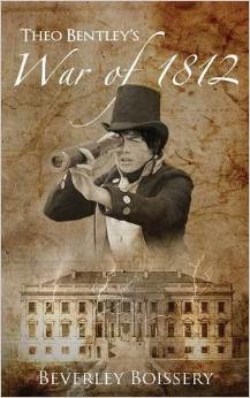 Beverley Boissery has also written a book ideal for teenage boys. Theo Bentley’s War of 1812 is set in what is now Ontario, 200 years ago. Here is the publisher’s description of the content:
Beverley Boissery has also written a book ideal for teenage boys. Theo Bentley’s War of 1812 is set in what is now Ontario, 200 years ago. Here is the publisher’s description of the content:
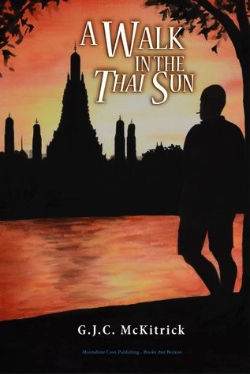 I’m cheating a bit by including A Walk in the Thai Sun. But Greg McKitrick – though he is now in Alberta – has strong ties with Metro Vancouver, having lived, gone to school (Regent College) and worked here over many years.
I’m cheating a bit by including A Walk in the Thai Sun. But Greg McKitrick – though he is now in Alberta – has strong ties with Metro Vancouver, having lived, gone to school (Regent College) and worked here over many years.Life for retired police officer, Sam Watson, is a solitary affair. His wife is dead and his daughter wants little to do with him. His most important relationship is with his son, Jeff, but even that relationship is strained too due to Jeff unwavering commitment to the Christian faith. Sam has little use for religion. When Jeff’s faith leads him to dedicate his life to missionary service in Thailand, Sam is devastated. An uneasy long distance relationship continues until, one day, a man from Jeff’s mission arrives at Sam’s door with the news that Jeff has been murdered.
Sam’s life dissolves into a fog of grief as he awaits news of the capture of his son’s killer. When that news does not come Sam decides to go to Thailand and seek justice. But this turns into more than a simple murder investigation as Sam also grapples with loss, culture shock and, ultimately, the meaning of his son’s short life.
Greg and his wife Annie lived in rural Thailand as Christian workers between 1986 and 1990; thus the book is set during that time period.
Response to the book has been good. Maybe it’s not surprising that his friend Mike Mason would be inclined to be positive, but I’ve read enough of Greg’s book to know he’s onto something:
A comparison with Graham Greene comes to mind – for the clarity of the prose, the exotic locale, the noir ambience, the dead-centre dialogue, the complexity of characterization, and most of all for the subtle spiritual dimension of this writing, which is less a dimension than a pervasive atmosphere.
And Regent College prof Loren Wilkinson puts what is, on the surface, an easy read, into a larger perspective:
The story gives us a vivid glimpse of the postmodern world of sweat-shops and sex tourism, where differences in faith – in this case between Buddhism and Christianity – seem trivial compared to the growing gap between rich and poor. But when we have finished walking with the father through the Thai sun, we are more able to understand the longing for full humanity, which in ways both profound and perverted, motivates every character in the story.
Look for more from Greg, before too long, under the name T.K. Boomer; he is currently completing The Fahr, the first novel in a science fiction trilogy.
Wesley Robert Lowe: Shaolin Darkness / Spirits of Chinatown / Chinatown Haunting
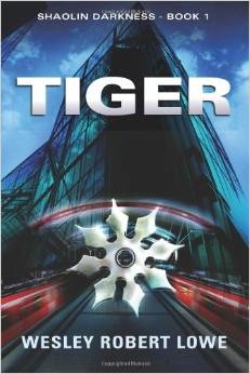 Wesley Robert Lowe says he has always wanted to be a writer, and wrote his first ‘novel’ while still in elementary school. But after getting an MA in music, he composed for film and television. Then he decided he wanted to tell stories again.
Wesley Robert Lowe says he has always wanted to be a writer, and wrote his first ‘novel’ while still in elementary school. But after getting an MA in music, he composed for film and television. Then he decided he wanted to tell stories again.
“Because I was working in media,” he says, “I started making films and documentaries. You can’t make a film without writing out the stories and that’s what I started doing. A couple years ago, I realized I could never make all the films of stories I had ideas about so I started writing stand-alone novels and non-fiction books.”
And Wesley has been busy. He has written three series: Shaolin Darkness, Spirits of Chinatown and Chinatown Haunting. Here is how he describes the unique outlook he brings to his books:
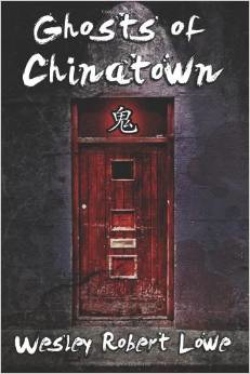 There are many talented thriller writers out there, many fantastic action authors and many masters of paranormal storytelling.
There are many talented thriller writers out there, many fantastic action authors and many masters of paranormal storytelling.
However, there are few of us that are products of East and West that integrate this background into our stories. My family has been in North America for over a hundred years, but I still have deep roots in the Chinese community and am the product of a multicultural heritage. I grew up watching Bruce Lee and Muhammad Ali, reading Mario Puzo and Amy Tan, and wanted to integrate the ‘Orient and Occident’ into my stories. Shaolin martial arts training, organized crime, Triads, the Tao, Confucius, Christianity, Hong Kong, New York, Shanghai, Portland novels show the contemporary world as a multicultural, multi-dimensional, inter-racial society.
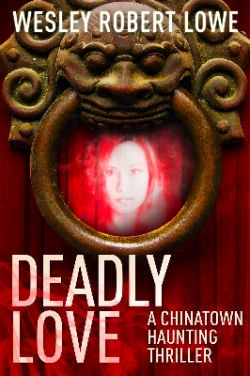 The books in the Shaolin Darkness series create a place “where East and West clash, collude and collide, entwining deep characters with electric action. Contemporary worlds steeped with ancient mysticism – they harken back to Shaolin, a mystical, spiritual and physical way of life that began in China 1500 years ago. [These are] rich stories that will entertain even the most adrenaline-charged reader.”
The books in the Shaolin Darkness series create a place “where East and West clash, collude and collide, entwining deep characters with electric action. Contemporary worlds steeped with ancient mysticism – they harken back to Shaolin, a mystical, spiritual and physical way of life that began in China 1500 years ago. [These are] rich stories that will entertain even the most adrenaline-charged reader.”
The Spirits of Chinatown trilogy “follows pianist Todd Mathers and his battle for redemption. In Beijing, Todd was accused of murdering his actress girlfriend Jasmine.” The Chinatown Haunting series is “urban fantasy, supernatural thrillers that take place in and around Vancouver’s colourful Chinatown.”
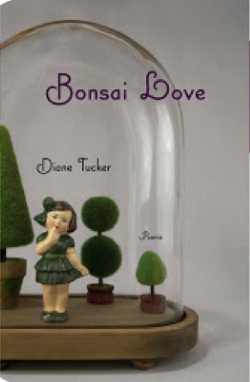 When Prism Magazine interviewed Diane Tucker earlier this year, they noted her versatility:
When Prism Magazine interviewed Diane Tucker earlier this year, they noted her versatility:Diane Tucker has been on a bit of a roll of late – a novel (His Sweet Favour, Thistledown Press, 2009) and a play (Here Breaks The Heart: the Loves of Christina Rossetti, Fire Exit Theatre, 2013) have come out in relatively quick succession. But it’s been seven years since her last book of poetry, and eighteen since the book prior – her debut, God on His Haunches (Nightwood, 1996) – was shortlisted for the Gerard Lampert Award.
So despite Diane’s productivity, her third poetry collection, Bonsai Love (Harbour Publishing, 2014), seems long overdue.
Harbour Publishing described Bonsai Love this way, as it launched the book:
In Bonsai Love, Diane Tucker takes on that most amorphous, challenging and inescapable of literary themes: love. Her eloquent poems move us through the evolving stages of a single relationship, from beginning to bittersweet end. Carefully pruned, intricate in design and sensitive to intrusion, these poems combine to organically reveal an intricate love story.
Tucker’s poems dissect the large Louisiana heart of a bullfrog, find melancholy in a single silver earring craving its lonely velvet box, are overcome by quiet desire in the tunnels of books at the public library, and know that sore throats can be caused by more than sickness, but by our own detestable words. Bonsai Love is a discovery of love on all levels – a deep investigation of what it means to care and be cared for.
Diane, who grew up in southeast Vancouver and now lives in Burnaby, had this to say about her faith, in the Prism interview:
The foundational truth of my life is that I am a Christian. Bonsai Love is a religious book only in the sense that everything a believer does is, ideally, informed by her faith, insofar as her faith is integrated into her being. And one of the great goals of a Christian’s life is that there be progressively less and less difference between who one is on the inside and how one lives on the outside.
A Christian trusts that God is doing this work. So I feel no compulsion to use poems to proselytize or push an institutional agenda. In my experience that produces lousy poetry anyway, and letting bad poetry into the world intentionally is a kind of sin. I trust what poetry is; my faith is the faith of the Word, and the Word made flesh, after all! No better endorsement of the metaphor and all it implies than Jesus himself: God’s Word made flesh. And I trust what Jesus said about the truth making you free. And if the truth makes you free, then I am free to tell the truth and trust God with the results.
Go to the interview for a good glimpse into Diane’s life, her craft and her faith.
Sheila Rosen: Silence: The Breaking of it
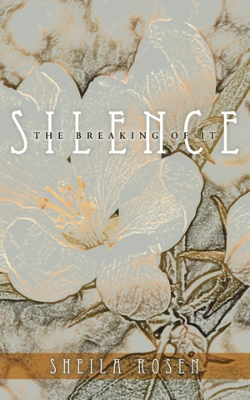 Like Diane Tucker, Sheila Rosen is a member of the Burnaby Writers’ Society.
Like Diane Tucker, Sheila Rosen is a member of the Burnaby Writers’ Society.
Silence: The Breaking of it “explores a vibrant childhood among the interned Japanese in small town BC, young love and loss, and a vision of the larger world that is both spiritual and deeply human.”
Sheila’s work is praised by fellow poets Luci Shaw (“Each of Sheila Rosen’s poems quivers with sounds and songs from the heart.”) and Susan McCaslin (“These poems fling the reader into the mystical and cosmological without losing touch with the everyday . . .”).
Mike Mason: Twenty-one Candles: Stories for Christmas
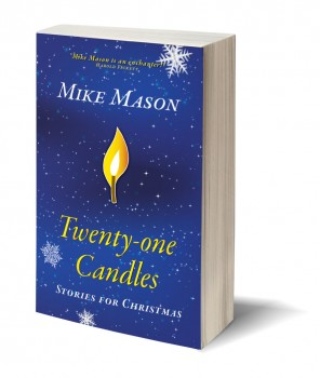 Mike Mason has been storing up treasures for more than two decades. In his case, the treasures are short stories he has been circulating to a select circle of his closest friends; now he’s gathered them all together, in Twenty-one Candles: Stories for Christmas.
Mike Mason has been storing up treasures for more than two decades. In his case, the treasures are short stories he has been circulating to a select circle of his closest friends; now he’s gathered them all together, in Twenty-one Candles: Stories for Christmas.
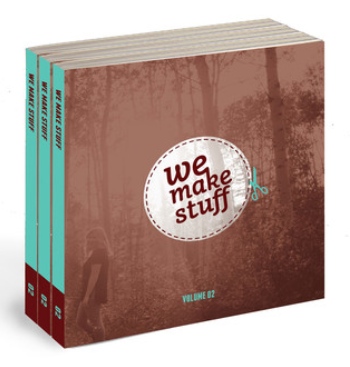 I wrote about WeMakeStuff 02 just last week; go here and then follow the link to the 90 second video which will no doubt convince you that there is a lot of creativity on the edges of the Metro Vancouver church – and that this book has captured a good portion of it. An ideal Christmas gift for the creative type in your family circle.
I wrote about WeMakeStuff 02 just last week; go here and then follow the link to the 90 second video which will no doubt convince you that there is a lot of creativity on the edges of the Metro Vancouver church – and that this book has captured a good portion of it. An ideal Christmas gift for the creative type in your family circle.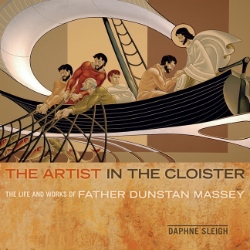 One book I neglected to mention last year was Daphne Sleigh’s The Artist in the Cloister: The Life and Works of Father Dunstan Massey. The book was a Winner (Honourable Mention), 2014 BC Historical Federation Lieutenant-Governor’s Medal for Historical Writing. Here is the publisher’s description:
One book I neglected to mention last year was Daphne Sleigh’s The Artist in the Cloister: The Life and Works of Father Dunstan Massey. The book was a Winner (Honourable Mention), 2014 BC Historical Federation Lieutenant-Governor’s Medal for Historical Writing. Here is the publisher’s description:Acknowledged by some as one of the major British Columbian artists of his generation, Dunstan Massey could have developed a successful public career in Vancouver or Toronto as an artist or musician – or perhaps even as an actor or academic. But none of this happened because at the age of 18 he renounced every one of these possibilities and dedicated his life to God. Daphne Sleigh introduces both the artist and his art in this fascinating and lavishly illustrated new biography.
